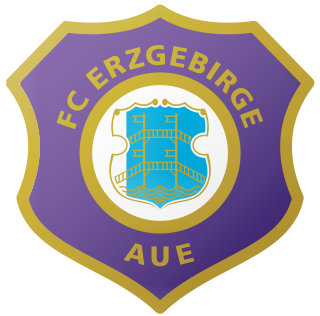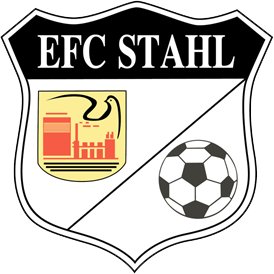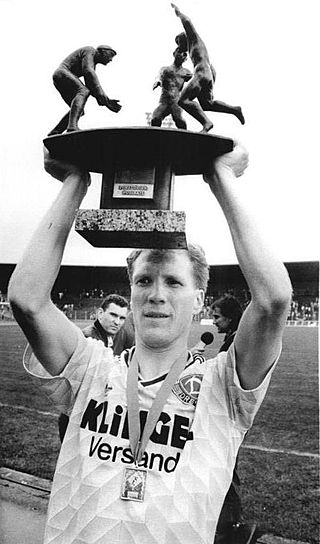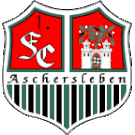
The DDR-Oberliga was the top-level association football league in East Germany.

Fußball Club Erzgebirge Aue e.V., commonly known as simply FC Erzgebirge Aue or Erzgebirge Aue, is a German football club based in Aue-Bad Schlema, Saxony. The former East German side was a founding member of the 3. Liga in 2008–09, after being relegated from the 2. Bundesliga in 2007–08. The city of Aue-Bad Schlema has a population of about 20,800, making it one of the smallest cities to ever host a club playing at the second highest level of German football. However, the team attracts supporters from a larger urban area that includes Chemnitz and Zwickau, whose own football sides are among Aue's traditional rivals.

Eisenhüttenstädter FC Stahl was a German association football club based in Eisenhüttenstadt in Brandenburg. The club dissolved in 2016 and merged into FC Eisenhüttenstadt. FC Eisenhüttenstadt plays in the sixth tier Brandenburg-Liga as of the 2021–22 season.

Hallescher FC, formerly known as Chemie Halle, is a German association football club based in Halle an der Saale, Saxony-Anhalt. The club currently plays in the Regionalliga, the fourth highest level in the German football league system.

1. FC Lok Stendal is a German association football club that plays in Stendal, Saxony-Anhalt.

The FDGB-Pokal was an elimination football tournament held annually in East Germany. It was the second most important national title in East German football after the DDR-Oberliga championship. The founder of the competition was East Germany's major trade union.

FSV Zwickau is a German association football club located in Zwickau, Saxony. Today's club claims as part of its complex heritage sides that were East Germany's first champions: 1948 Ostzone winners SG Planitz and 1950 DDR-Oberliga champions ZSG Horch Zwickau.

SV Germania Schöneiche is a German association football club from Schöneiche in Brandenburg.

FSV Optik Rathenow is a German association football club who compete in the Oberliga. The club is situated in the city of Rathenow, near Berlin, and play their home games at the Vogelgesang.
The 1963–64 DDR-Oberliga was the 15th season of the DDR-Oberliga, the first tier of league football in East Germany.
FC Grün-Weiß Wolfen was a German association football club from the industrial city of Bitterfeld-Wolfen in southern Saxony-Anhalt.

Brandenburger SC Süd is a German association football club from the town of Brandenburg, in the federal state of the same name. The footballers are part of a larger sports club that also has departments for bowling, canoeing, cycling, swimming, and volleyball.
The all-time DDR-Oberliga table is a cumulative record of all match results, points, and goals of every team that played in the former East Germany's first division DDR-Oberliga from its inception in 1949 until its dissolution in 1991 following German reunification. It awards two points for a win and one point for a draw, as this was the system in use at the time. The matches of the transition round made necessary by the adoption of a Soviet-style calendar year schedule in 1955 are not included. In its final season (1990–91), the competition was known as the NOFV-Oberliga, before becoming part of the German Football Association.

SV Motor Altenburg is a German football club from the city of Altenburg, Thuringia. The club was established 8 March 1946 as the postwar successor to Eintracht 1908 Altenburg and was part of East German football competition. The current day club also has departments for bowling, gymnastics, and judo.

Ulrich "Ulli" Schulze is a German football manager and former player. A goalkeeper, he made one appearance for the East Germany national team.

VFC Anklam is a German football club from the city of Anklam, Mecklenburg-Vorpommern.

FC Treptow is a German association football club from the city of Berlin and is the successor to Werkverein der BEWAG Berlin which was established in 1928 as the worker's sports club of the city's electric utility Bewag Aktiengesellschaft.
FC Mecklenburg Schwerin is a German football club based in Schwerin in Mecklenburg-Vorpommern. The club was formed from a merger in 2013 and competes in the fifth tier NOFV-Oberliga Nord. The club plays its home matches at the Sportpark Lankow. FC Mecklenburg Schwerin also has gymnastics squads and an Esports department.
BSG Chemie Leipzig was a German football club from the Leutzsch district of Leipzig, Saxony. The prewar identity of the club is rooted in the establishment of Britannia Leipzig in 1899 and its successor TuRa Leipzig. During the socialist era, the traditions of the club were continued in the East German teams BSG Chemie Leipzig and SC Lokomotive Leipzig before the emergence of FC Sachsen Leipzig following German reunification, which continued the clubs traditions.














